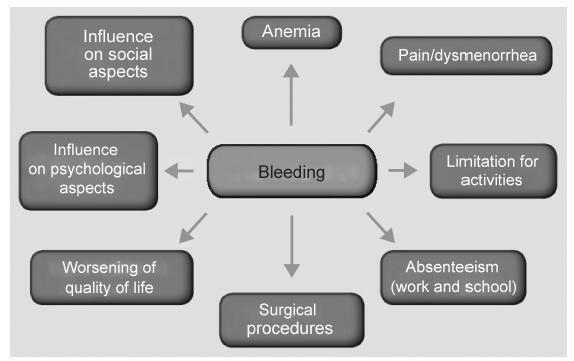Revista Brasileira de Ginecologia e Obstetrícia. 2017;39(7):358-368

Abnormal uterine bleeding is a frequent condition in Gynecology. It may impact physical, emotional sexual and professional aspects of the lives of women, impairing their quality of life. In cases of acute and severe bleeding, women may need urgent treatment with volumetric replacement and prescription of hemostatic substances. In some specific cases with more intense and prolonged bleeding, surgical treatment may be necessary. The objective of this chapter is to describe the main evidence on the treatment of women with abnormaluterinebleeding, both acuteand chronic.Didactically,thetreatmentoptions were based on the current International Federation of Gynecology and Obstetrics (FIGO) classification system (PALM-COEIN). The etiologies of PALM-COEIN are: uterine Polyp (P), Adenomyosis (A), Leiomyoma (L), precursor and Malignant lesions of the uterine body (M), Coagulopathies (C), Ovulatory dysfunction (O), Endometrial dysfunction (E), Iatrogenic (I), and Not yet classified (N). The articles were selected according to the recommendation grades of the PubMed, Cochrane and Embase databases, and those in which the main objective was the reduction of uterine menstrual bleeding were included. Only studies written in English were included. All editorial or complete papers that were not consistent with abnormal uterine bleeding, or studies in animal models, were excluded. The main objective of the treatment is the reduction of menstrual flow and morbidity and the improvement of quality of life. It is important to emphasize that the treatment in the acute phase aims to hemodynamically stabilize the patient and stop excessive bleeding, while the treatment in the chronic phase is based on correcting menstrual dysfunction according to its etiology and clinical manifestations. The treatment may be surgical or pharmacological, and thelatterisbasedmainlyonhormonaltherapy,anti-inflammatorydrugsandantifibrinolytics.
Search
Search in:


Comments